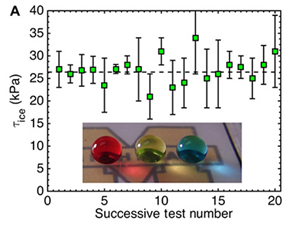



Date:28/03/16
 Researchers have developed a spray-on coating capable of making car windshields, airplanes and other objects ice-proof.
Researchers have developed a spray-on coating capable of making car windshields, airplanes and other objects ice-proof.
A team of scientists from the University of Michigan announced the new spray-on coating method Friday, suggesting it may save scores of equipment from oil rigs to household freezers.
"Researchers had been trying for years to dial down ice adhesion strength with chemistry, making more and more water-repellent surfaces," Kevin Golovin, a doctoral student in materials science and engineering, said in a statement. "We've discovered a new knob to turn, using physics to change the mechanics of how ice breaks free from a surface."
The ice repellant is a spray-on, thin, clear and slightly rubbery substance that causes ice to easily slide off surfaces. The new substance is explained in a study published in the journal Science Advances.
Researchers found water-repellent substances weren't as effective in repelling ice, but soon found rubbery surfaces do a better job -- even if they didn't repel water.
"Nobody had explored the idea that rubberiness can reduce ice adhesion," study lead Anish Tuteja said. "Ice is frozen water, so people assumed that ice-repelling surfaces had to also repel water. That was very limiting."
The new method is more durable than previously-established ice repellants, which are said to be less effective. Scientists said the new coating was able to stand up against various lab tests including peel tests, corrosion tests and exposure to high temperatures.
The team has already developed an array of variations of the new coating to meet the needs of various industries from commercial food to aerospace.
"I think the first commercial application will be in linings for commercial frozen food packaging, where sticking is often a problem. We'll probably see that within the next year," Tuteja said. "Using this technology in places like cars and airplanes will be very complex because of the stringent durability and safety requirements, but we're working on it."
Scientists develop durable ice repellant for commercial use
 Researchers have developed a spray-on coating capable of making car windshields, airplanes and other objects ice-proof.
Researchers have developed a spray-on coating capable of making car windshields, airplanes and other objects ice-proof.A team of scientists from the University of Michigan announced the new spray-on coating method Friday, suggesting it may save scores of equipment from oil rigs to household freezers.
"Researchers had been trying for years to dial down ice adhesion strength with chemistry, making more and more water-repellent surfaces," Kevin Golovin, a doctoral student in materials science and engineering, said in a statement. "We've discovered a new knob to turn, using physics to change the mechanics of how ice breaks free from a surface."
The ice repellant is a spray-on, thin, clear and slightly rubbery substance that causes ice to easily slide off surfaces. The new substance is explained in a study published in the journal Science Advances.
Researchers found water-repellent substances weren't as effective in repelling ice, but soon found rubbery surfaces do a better job -- even if they didn't repel water.
"Nobody had explored the idea that rubberiness can reduce ice adhesion," study lead Anish Tuteja said. "Ice is frozen water, so people assumed that ice-repelling surfaces had to also repel water. That was very limiting."
The new method is more durable than previously-established ice repellants, which are said to be less effective. Scientists said the new coating was able to stand up against various lab tests including peel tests, corrosion tests and exposure to high temperatures.
The team has already developed an array of variations of the new coating to meet the needs of various industries from commercial food to aerospace.
"I think the first commercial application will be in linings for commercial frozen food packaging, where sticking is often a problem. We'll probably see that within the next year," Tuteja said. "Using this technology in places like cars and airplanes will be very complex because of the stringent durability and safety requirements, but we're working on it."
Views: 582
©ictnews.az. All rights reserved.Similar news
- The mobile sector continues its lead
- Facebook counted 600 million active users
- Cell phone testing laboratory is planned to be built in Azerbaijan
- Tablets and riders outfitted quickly with 3G/4G modems
- The number of digital TV channels will double to 24 units
- Tax proposal in China gets massive online feedback
- Malaysia to implement biometric system at all entry points
- Korea to build Green Technology Centre
- Cisco Poised to Help China Keep an Eye on Its Citizens
- 3G speed in Azerbaijan is higher than in UK
- Government of Canada Announces Investment in Green Innovation for Canada
- Electric cars in Azerbaijan
- Dominican Republic Govt Issues Cashless Benefits
- Spain raises €1.65bn from spectrum auction
- Camden Council boosts mobile security





















